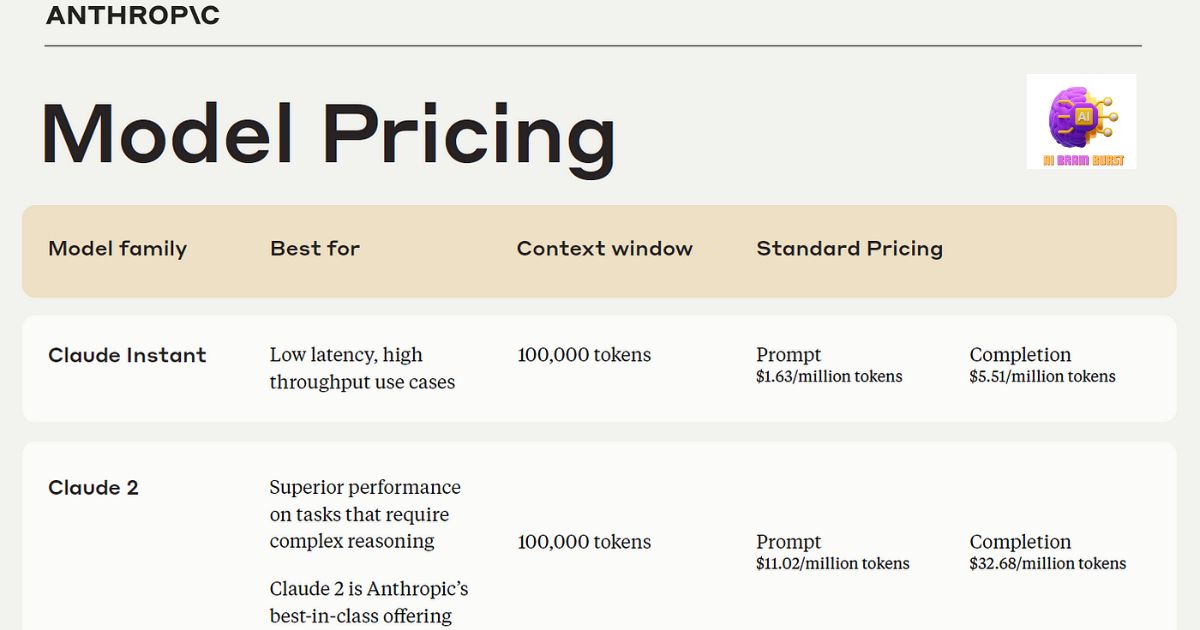Overview of Claude 2
As artificial intelligence continues to evolve and reshape various industries, Claude 2 has emerged as a game-changer in the realm of conversational AI. Developed by Anthropic, this cutting-edge language model boasts advanced natural language processing capabilities, allowing it to understand and respond to human queries with remarkable accuracy and context awareness.
Claude 2 is a versatile AI assistant that can tackle a wide range of tasks, from creative writing and coding to data analysis and research. Its ability to comprehend complex topics and provide insightful responses makes it an invaluable tool for professionals, students, and individuals seeking reliable and efficient assistance.
Claude 2 Plans & Pricing for Personal Use
Anthropic recognizes the diverse needs of its users and offers a range of pricing plans tailored to suit individual requirements. Whether you’re a casual user or a power user, there’s a plan that fits your needs and budget. For example, those interested in exploring Anthropic’s AI offerings can check out the Life2Vec AI Login for the Basic Plan – a great option for casual users. The Basic Plan provides limited access to experience the power of Claude 2 without a long-term commitment.
Basic Plan
The Basic Plan is perfect for those who want to experience the power of Claude 2 without committing to a long-term subscription. This plan offers:
- Limited access: You can interact with Claude 2 for a fixed number of tokens or a specific duration.
- Ideal for exploration: This plan is excellent for individuals who want to explore the capabilities of Claude 2 before deciding on a more comprehensive plan.
- Cost-effective: The Basic Plan is designed to be affordable, making it accessible to a wide range of users.
Pro Plan
For those seeking a more immersive experience with Claude 2, the Pro Plan offers enhanced features and flexibility. This plan includes:
- Unlimited access: Enjoy unrestricted access to Claude 2, allowing you to leverage its capabilities without worrying about usage limits.
- Priority support: Benefit from dedicated support channels, ensuring that your queries and concerns are addressed promptly.
- Advanced features: Unlock additional features and customization options to tailor Claude 2 to your specific needs.
Business Plan
Designed for entrepreneurs, small businesses, and professionals, the Business Plan provides a comprehensive suite of tools and resources to streamline workflow and boost productivity. Key features include:
- Team collaboration: Share and collaborate on projects with your team members, fostering seamless communication and coordination.
- Integrations: Connect Claude 2 with your existing tools and applications for a seamless workflow.
- Analytics and reporting: Gain valuable insights into your usage patterns and productivity metrics.
Explore Related Tools
In addition to its core AI capabilities, Claude 2 offers a range of complementary tools and services to enhance your experience. Explore features such as:
- Natural language processing (NLP) toolkit: Leverage advanced NLP techniques for text analysis, sentiment analysis, and more.
- Knowledge base integration: Connect Claude 2 with your existing knowledge bases for seamless information retrieval and management.
- Custom model training: Train Claude 2 on your proprietary data and domain-specific knowledge to create tailored AI solutions.
Benefits of Usage-Based Pricing

Anthropic has adopted a usage-based pricing model for Claude 2, which offers several advantages over traditional subscription-based or flat-rate pricing structures. Here are some of the key benefits:
- Pay for what you use: With usage-based pricing, you only pay for the resources you consume, ensuring that you’re not overcharged for features or capabilities you don’t need.
- Scalability: As your needs grow or change, you can easily scale your usage of Claude 2 without being locked into a rigid pricing plan.
- Cost control: Usage-based pricing allows you to better manage your costs and budget, as you have visibility into your usage patterns and can adjust accordingly.
- Flexibility: Whether you’re a casual user or have fluctuating demands, usage-based pricing provides the flexibility to adapt to your changing requirements.
- Incentive for efficiency: By directly tying costs to usage, usage-based pricing incentivizes users to optimize their workflows and minimize unnecessary resource consumption.
Cost Comparisons
To help you make an informed decision, let’s compare the pricing of Claude 2 with some of its competitors in the AI assistant market:
| AI Assistant | Pricing Model | Base Cost |
|---|---|---|
| Claude 2 | Usage-based | $0.03 per 1000 tokens |
| GPT-3 | Usage-based | $0.06 per 1000 tokens |
| Google AI | Subscription | $9.99/month (basic) |
| Amazon Alexa | Subscription | $4.99/month (basic) |
As you can see, Claude 2 offers competitive pricing, especially for users with high usage requirements. Additionally, its usage-based model provides more flexibility and cost control compared to subscription-based alternatives.
Claude 2 Plans & Pricing for Enterprise
For businesses and organizations with more complex needs, Anthropic offers enterprise-level plans that provide advanced features, dedicated support, and customization options.
Team Plan
The Team Plan is designed for small to medium-sized businesses that require collaboration and project management capabilities. Key features include:
- Shared workspaces: Create shared workspaces for teams to collaborate on projects, share resources, and communicate efficiently.
- Role-based access control: Manage user permissions and access levels to ensure data security and privacy.
- Customizable templates: Streamline workflows with customizable templates for common tasks and processes.
Business Plan
Tailored for larger organizations and enterprises, the Business Plan offers advanced features and robust security measures. Highlights include:
- Enterprise-grade security: Benefit from industry-leading security protocols, including data encryption, access controls, and audit trails.
- Dedicated support: Enjoy priority support from a dedicated team of experts to address your specific needs.
- Customization and integration: Customize Claude 2 to align with your business processes and integrate it with your existing systems and tools.
Limitations
While the Team and Business Plans offer powerful features, there are some limitations to consider:
- Usage limits: These plans may have usage limits or quotas to manage resource consumption and ensure optimal performance.
- Deployment restrictions: Certain deployment options or customizations may be limited or require additional fees.
- Advanced support: Premium support options, such as dedicated account managers or on-site support, may incur additional costs.
Enterprise Plan
For organizations with the most demanding requirements, the Enterprise Plan provides a tailored solution with maximum flexibility and customization options. Key features include:
- Dedicated infrastructure: Deploy Claude 2 on dedicated infrastructure for enhanced security, performance, and isolation.
- On-premises deployment: Host Claude 2 within your own data centers or private cloud environments.
- Custom model training: Train Claude 2 on your proprietary data and domain-specific knowledge to create highly specialized AI models.
- Priority feature development: Collaborate with Anthropic’s development team to prioritize new features and enhancements tailored to your needs.
The Enterprise Plan pricing is customized based on your specific requirements, infrastructure needs, and desired level of support and customization.
What Factors Determine Claude 2 Pricing?

While usage is the primary factor that determines the cost of using Claude 2, several other elements play a role in shaping the pricing structure. Understanding these factors can help you make informed decisions and optimize your usage for cost-effectiveness.
- Compute resources: Claude 2 is a resource-intensive AI model that requires significant compute power to operate effectively. The processing power required to handle user queries, generate responses, and perform complex tasks directly impacts the overall cost.
- Model complexity: More advanced and capable AI models, like Claude 2, tend to have higher computational requirements and training costs. As Anthropic continues to improve and refine the model, these improvements may be reflected in the pricing.
- Data processing: Certain tasks, such as large-scale data analysis or natural language processing, may incur additional costs due to the data processing and storage requirements involved.
- Feature set: Advanced features, such as custom model training, integration with third-party tools, or specialized APIs, may come at an additional cost to account for the development and maintenance efforts.
- Support and maintenance: The cost of providing customer support, bug fixes, and regular software updates is factored into the pricing to ensure a high-quality user experience.
- Geographic location: Depending on the region or country you’re accessing Claude 2 from, pricing may vary due to factors like data center costs, local market conditions, and compliance requirements.
By understanding these factors, users can better anticipate and manage their costs while leveraging the full potential of Claude 2.
Use Case Examples
To illustrate the versatility and potential cost savings of using Claude 2, let’s explore a few common use cases:
- Content creation: A freelance writer could leverage Claude 2 to generate high-quality content, conduct research, and refine their writing. By paying only for the resources consumed, they can potentially save significant costs compared to hiring human writers or subscribing to expensive writing tools.
- Data analysis: A small business can use Claude 2 to analyze customer data, identify trends, and gain valuable insights without the need for expensive data scientists or analytics tools. The usage-based pricing model ensures they only pay for the resources they actually consume.
- Customer service: A company can integrate Claude 2 into their customer service workflow to handle routine inquiries, freeing up human agents to focus on more complex issues. The cost savings from reduced staffing requirements can be substantial, while still providing excellent customer service.
- Research and development: Scientists and researchers can utilize Claude 2 to assist with literature reviews, data analysis, and hypothesis generation, potentially accelerating their research efforts and reducing costs associated with manual tasks.
These examples illustrate how Claude 2’s pricing model can benefit a wide range of users, from individuals to enterprises, by providing cost-effective access to advanced AI capabilities.
Estimated Cost for Using the Claude API

To help you better understand the potential costs associated with using the Claude API, let’s consider a few hypothetical scenarios:
- Personal blog writing: Suppose you use Claude 2 to generate a 1,000-word blog post every week. Assuming an average of 3 tokens per word, that’s 3,000 tokens per post. At $0.03 per 1,000 tokens, the cost would be approximately $0.09 per post or $4.68 per year.
- Small business data analysis: A small e-commerce business needs to analyze customer data and generate reports monthly. Assuming a usage of 100,000 tokens per month, the cost would be around $3 per month or $36 per year.
- Enterprise customer service: A large company integrates Claude 2 into their customer service workflow, handling an average of 1 million tokens per day. At the enterprise pricing of $0.01 per 1,000 tokens, the daily cost would be approximately $10, or $3,650 per year.
Please note that these are rough estimates based on hypothetical scenarios and may vary depending on your actual usage patterns and requirements.
Claude 2 Cost Saving Tips
While Claude 2’s usage-based pricing model offers flexibility and cost control, there are several strategies you can employ to further optimize your costs:
- Batch processing: Whenever possible, batch your requests and process them in larger chunks, as this can be more cost-effective than making numerous small requests.
- Optimize prompts: Carefully craft your prompts and input data to be concise and efficient, reducing the number of tokens required for processing.
- Caching and reuse: Implement caching mechanisms to store and reuse previously generated responses or outputs, reducing the need for redundant processing.
- Monitor usage: Regularly monitor your usage patterns and adjust your workflows or pricing plan accordingly to avoid unnecessary costs.
- Explore alternative models: For certain tasks, consider using less resource-intensive AI models or services if they can meet your requirements at a lower cost.
- Negotiate enterprise pricing: For large-scale deployments, consider negotiating custom enterprise pricing with Anthropic to take advantage of volume discounts or long-term commitments.
By implementing these cost-saving strategies, you can maximize the value you derive from Claude 2 while maintaining a reasonable budget.
Connect Claude API to Google Sheets (Script)

To illustrate the power and versatility of Claude 2, let’s explore a practical example of integrating it with Google Sheets using a script. This integration can be incredibly useful for automating various tasks, such as data analysis, report generation, and content creation.
Here’s a step-by-step guide to connect the Claude API to Google Sheets:
- Create a new Google Apps Script project: In your Google Sheets document, go to “Tools” > “Script Editor” to create a new project.
- Install the necessary libraries: In the script editor, go to “Resources” > “Libraries” and add the following libraries:
UrlFetchApp: for making HTTP requests to the Claude APIJSON: for parsing JSON responses
- Set up API credentials: Obtain an API key from Anthropic and store it securely in your script’s project properties or environment variables.
- Write a function to call the Claude API: Create a new function in your script that sends a request to the Claude API endpoint, passing in your prompt or input data. Here’s an example:javascriptCopy code
function callClaudeAPI(prompt) { const apiKey = 'YOUR_API_KEY'; // Replace with your actual API key const endpoint = 'https://api.anthropic.com/v1/complete'; const headers = { 'Content-Type': 'application/json', 'Authorization': 'Bearer ' + apiKey }; const payload = { 'prompt': prompt, 'model': 'claude-v1', 'max_tokens': 500 // Adjust as needed }; const options = { 'method': 'post', 'headers': headers, 'payload': JSON.stringify(payload) }; const response = UrlFetchApp.fetch(endpoint, options); const result = JSON.parse(response.getContentText()); return result.choices[0].text; } - Integrate with Google Sheets: Create a custom menu or use the script editor’s built-in functions to call your API function from within Google Sheets. You can pass in prompts or data from your spreadsheet cells and receive the generated output directly in your sheet.
By connecting Claude 2 to Google Sheets, you can streamline various tasks and leverage the power of AI to automate workflows, analyze data, and generate content directly within your spreadsheet environment.
The All-in-One Newsletter for AI Enthusiasts

Stay ahead of the curve and never miss the latest developments in the world of artificial intelligence. Subscribe to our “AI Insider” newsletter, a comprehensive resource tailored for AI enthusiasts like you.
In each issue, you’ll find:
- Industry News: Stay informed about groundbreaking advancements, research breakthroughs, and industry trends shaping the future of AI.
- Product Updates: Get exclusive insights into new AI tools, updates, and pricing changes from leading providers like Anthropic.
- Expert Insights: Gain valuable perspectives from renowned AI experts, researchers, and thought leaders through interviews and op-eds.
- Use Case Studies: Explore real-world examples of how businesses and individuals are leveraging AI to drive innovation and efficiency.
- Learning Resources: Expand your knowledge with curated educational content, tutorials, and training opportunities for various AI technologies and applications.
- Community Highlights: Connect with fellow AI enthusiasts, join discussions, and discover upcoming events and meetups in your area.
By subscribing to the “AI Insider” newsletter, you’ll stay up-to-date with the latest advancements, trends, and opportunities in the rapidly evolving AI landscape. Don’t miss out – subscribe today and unlock a world of AI insights delivered straight to your inbox.
Conclusion
In summary, Claude 2 offers impressive AI capabilities at competitive pricing. Its usage-based model is flexible and cost-effective. Users only pay for what they use. The plans cater to different needs – from basic to enterprise. Individuals can explore Claude 2 at low cost. Businesses can leverage it to boost productivity and insights. Overall, Claude 2 is a powerful AI assistant worth considering.
To get started, review the pricing plans on Anthropic’s website. Check out the free trial or basic plan first. Estimate your potential usage and costs. Implement cost-saving tips like batch processing. Integrate Claude 2 into your workflows using APIs or tools like Google Sheets. Stay updated on new features and pricing changes through the AI Insider newsletter. With its continual improvements, Claude 2 will likely become even more capable and valuable over time.
FAQ
Does Claude 2 cost money?
Yes, Claude 2 is a paid service offered by Anthropic. While there may be limited free trials or basic plans available, most users will need to pay to access and utilize the full capabilities of Claude 2. Anthropic has adopted a usage-based pricing model, where users are charged based on their actual consumption of Claude 2’s resources, measured in tokens (units of text).
How much does the Claude model cost?
The cost of using the Claude model varies depending on the specific pricing plan and usage. For individual users, the base cost is $0.03 per 1,000 tokens. However, Anthropic offers different plans with varying pricing structures to cater to different user segments, such as personal, business, and enterprise users.
For example, the Basic Plan for personal use may offer a limited number of tokens or access duration at a lower cost, while the Pro Plan provides unlimited access at a higher price point. Business and Enterprise plans typically offer additional features, support, and customization options at higher price points based on usage and specific requirements.
What is the cost of Claude?
The cost of using Claude is primarily determined by your usage, measured in tokens (units of text). The base cost for individual users is $0.03 per 1,000 tokens. However, Anthropic offers different pricing plans with varying costs to cater to different user segments, such as personal, business, and enterprise users.
For example, the Basic Plan for personal use may offer a limited number of tokens or access duration at a lower cost, while the Pro Plan provides unlimited access at a higher price point. Business and Enterprise plans typically offer additional features, support, and customization options at higher price points based on usage and specific requirements.
Is Claude cheaper than ChatGPT?
Comparing the costs of Claude and ChatGPT can be complex, as their pricing models and plans may differ. However, based on the publicly available information, Claude’s base cost of $0.03 per 1,000 tokens is generally lower than ChatGPT’s pricing, which is typically around $0.06 per 1,000 tokens for individual users.
It’s important to note that the actual costs can vary depending on your specific usage patterns, the features and capabilities you require, and any discounts or pricing plans you may be eligible for. Additionally, the pricing structures for both services may change over time, so it’s always best to check the latest pricing information from Anthropic and OpenAI (the company behind ChatGPT).
How much is Claude 2 vs GPT-4?
As of now, GPT-4 has not been publicly released, and its pricing details are not yet available. However, we can compare Claude 2 with GPT-3, the previous generation of OpenAI’s language model.
Claude 2’s base cost for individual users is $0.03 per 1,000 tokens, while GPT-3’s pricing for individual users is typically around $0.06 per 1,000 tokens. This suggests that Claude 2 may be more cost-effective than GPT-4, assuming OpenAI maintains a similar pricing structure for their new model.
However, it’s essential to keep in mind that GPT-4 is expected to be a more advanced and capable model than GPT-3, which could potentially justify higher pricing. Additionally, both Anthropic and OpenAI may introduce new pricing plans and structures when GPT-4 is released, so the actual cost comparison may vary.
Is Claude or GPT-4 better?
As GPT-4 has not been officially released yet, it’s difficult to make a definitive comparison between its capabilities and those of Claude. However, based on the information available, we can make some general observations:
- Capabilities: GPT-4 is expected to be a more advanced and powerful language model than its predecessor, GPT-3. It is likely to have improved performance in areas such as natural language understanding, reasoning, and task completion. However, Claude has also been developed with the latest advancements in AI and may offer unique strengths in certain areas.
- Training data: The specific training data and techniques used for GPT-4 and Claude may differ, which could lead to variations in their knowledge and performance across different domains or use cases.
- Ethics and safety: Both Anthropic and OpenAI have placed a strong emphasis on developing AI systems that are safe, ethical, and aligned with human values. However, their approaches and implementations may differ, potentially affecting the behavior and outputs of their respective models.
- Customization and fine-tuning: Depending on the specific use case and requirements, one model may be more suitable for customization and fine-tuning than the other, which could impact its overall performance and effectiveness.
Ultimately, the decision of whether Claude or GPT-4 is “better” will depend on the specific requirements, priorities, and use cases of the user or organization. It’s advisable to thoroughly evaluate both models, conduct tests, and consult with experts to determine the best fit for your needs.








